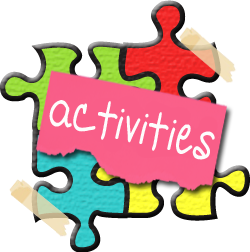UNIT 2. ACTIVITIES
ACTIVITIES
COMPREHENSION
EXERCISES
ANSWER THE FOLLOWING QUESTIONS:
1.-What does a
seed grow when it germinates?
2.-What does a
seed need to germinate?
3.-Why is water
important in germination?
4.-What do we
call the process by which plants produce their own food?
5.-Where do
plants store sugar?
6.-Why are sugar
and starches important for the plant?
7.-In which part
or the plant are flowers formed?
8.-How would you
define the flower?
9.-Why are the
petals of a flower brightly colored and scented?
10.-How many parts does
the pistil have? Can you name them?
11.-In which part of
the flower is pollen made?
12.-What is the stigma
like in order to attract pollen?
13.-How would you define
the fruit?
14.-Can you name some
pollinators?
15.-How are flower adapted
to attract pollinator?
16.-Why are insects so
important in pollination?
17.-Can you name
different agents that help spread seed?
COMPLETE THESE TEXTS WITH THE GIVEN WORDS
pushes swells
down splits
1.-When the seed absorbs water, it ……………………. and the seed coat …………………… When the seed germinates the stem ………………………through the soil to the open air. At the same time, the roots pushes ………………………. looking for water and nutrients.
leaves chloroplasts sugars photosynthesis emerges
2.-When a plant …………….. out of the soil, ……………… are developed in the stem and the process of ………………….. begins. The ……………….. found in the leaves convert energy, carbon dioxide and water into ……………..
without possible pollinators female
3.-……………………… carry the pollen from male parts of the flower to …………. Parts. …………………………… pollinators, reproduction of the plant would not be …...………………….
Replace the words printed in italics with the word or expression given:
Pollinators pollination moisture self-pollinate dormant germinate
1.-The seeds start growing when there is enough air and water and the temperature is right.
2.-Agents who transport pollen can be the wind, water, insects, furry animals and human beings.
3.-The process of carrying the pollen to the stigma is brought about by the wind or insects.
4.-Seeds remain in a resting state before germinating.
5.- Some plants can pollinate to themselves.
RELATIONSHIP BETWEEN STATEMENTS: CONTRAST
1.-Seeds remain dormant if they are kept cool and dry. When the amount of moisture and the temperature level are right, the seeds germinate and start growing. (However)
………………………………………………………………………………………………………………………………………………………………………………………………………….
2.-If dry seeds are
planted in dry soil, they will not germinate. If there are too much water they
will not germinate either. (On the other hand)
…………………………………………………………………………………………………………………………………………………………………………………………………………
3.-Dormant seeds
require very little oxygen in order to stay alive. When they start to germinate
they require more. (But)
…………………………………………………………………………………………………………………………………………………………………………………………………………
4.-In the early stages
of development the seedling depends on the foodstore in the seed. As soon as
the first leaves are produced, it is able to manufacture food for itself.
(However)
…………………………………………………………………………………………………………………………………………………………………………………………………………
DEFINITIONS OF PROCESSES USING TIME EXPRESSIONS
What happens during these processes. Use time expressions (First, then, next, after that, finally…)
1.-Germination
2.-Photosynthesis
3.-Pollination
EXPRESSIONS OF DEGREE
Look at the example and transform the sentences in the two ways shown:
The soil was dry. The seed could not germinate.
a.-The soil was too dry for the seed to germinate.
b.-The soil was so dry that the seed could not germinate
1.-The soil was
compact. The plants could not grow.
2.-Soil aeration was weak. The plant could not get enough oxygen.
3.-The roots were small. The tree could not grow.
4.-It was dark. Photosynthesis could not take place.
5.-The terrain was wet. It could not produce a good crop.

Comentarios
Publicar un comentario